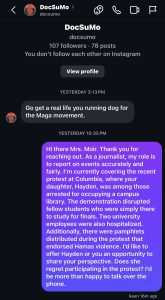Posted by Jon Levine
https://freebeacon.com/campus/heres-the-full-list-of-everyone-arrested-for-storming-columbia-library/
https://freebeacon.com/?p=2033797
Some people just aren't that interesting.
But for the sake of transparency, the Washington Free Beacon is publishing the names of the yet-reported anti-Israel radicals arrested after storming Columbia University’s Butler Library earlier this month.
They aren't celebrity nepo babies, or phallus-obsessed poets, or silver spoon activists, or do much for search engine optimization—but they were still part of a violent raid that injured two, distributed pro-Hamas flyers, and damaged university property.
Below are the names of the individuals arrested on May 7. All but one was charged with criminal trespassing for storming the Columbia library, while the outlier, Hamza Mankor, was charged with misconduct and threatening behavior. The vast majority were students of Columbia or its affiliates, Barnard College and Union Theological Seminary.

Columbia University Students
Nisreen Khokhar, a J.D. candidate at Columbia Law School, signed several anti-Israel letters before her arrest. Just days after Hamas’s Oct. 7 attack, while she was an undergraduate at the University of Michigan, Khokhar signed one that falsely accused Israel of committing genocide and called for an immediate ceasefire. She signed a second that was distributed following an anti-Israel demonstration inside a school building that resulted in 40 arrests in November 2023. It demanded the school divest from companies that do business in Israel and shut down their partnerships with Israeli universities. She was the first signatory on both letters.

Priyanka Joshi is a Columbia senior studying philosophy and evolutionary biology. Joshi pursued a dual degree with Trinity College Dublin, according to a webpage for the program that has since scrubbed her presence. She’s quoted on the page saying, "You don't have to have a reason for everything you do." She's currently seeking an internship in New York City, according to her now-deleted LinkedIn.

Jessie Rubin, a Ph.D candidate in ethnomusicology at Columbia, has long been a member of several anti-Israel groups, including Student Workers of Columbia (SWC), Students for Justice in Palestine, and Jewish Voice for Peace. She also helped form Columbia University Apartheid Divest (CUAD)—the Ivy League school’s most notorious anti-Semitic group that took credit for the Butler Library storming. Her father, Jeff Melnick, is a professor of American studies at University of Massachusetts Boston and describes himself as an "anti-Zionist." Hours after two young Israeli embassy staffers were killed in a brutal, close-range shooting, Melnick posted a defense of the slaying, arguing that "taking one life is not like killing all of humanity."

Brenda Gonzalez is a Columbia senior pursuing a double major in ethnicity and race studies and education. She is an occasional contributor to the San Francisco-based Spanish-language newspaper El Tecolote, where she has produced such pieces as "8 Latinx events that center community and resistance in San Francisco" and "These 7 S.F. organizations support undocumented immigrants. Here’s what they offer."
Two weeks after Matthew Ware’s arrest, he graduated from Columbia's Mailman School of Public Health and was inducted into the school’s Delta Omega Honor Society, which was established to "recognize outstanding achievement in the field of public health."

Nadia Schwingle listed herself as a Barnard alumna in a November 2023 petition demanding Columbia reinstate the university’s Students for Justice in Palestine chapter after it was suspended for repeatedly holding unauthorized anti-Israel protests. A university directory notes she is affiliated with Columbia’s School of Social Work.

Pramit Ghatak is a Columbia undergraduate studying computer science, according to university records. She signed a "dancers for Palestine" petition last year to show her solidarity. "Dance does not get an exception from the political realities of the places and times it is created," the petition read. "May we dance into liberation soon."
Ysabelle Tiana "Bell" Santos is pursuing a Masters of Social Work at Columbia. "I am for equity because equity starts with everyone," she touted in a now-deleted LinkedIn page. In the past, she has worked as a behavioral therapist for the Manhattan Psychology Group.

Fatima Aamir is a student at Columbia’s Teachers College, according to the school’s student directory. When she’s not agitating for Hamas, she works as a therapist for Manhattan Alternative, which provides "nationwide kink, poly, trans & LGBQ affirmative providers," according to its website.
"I create a therapeutic space where healing, self-exploration, and empowerment come together. I honor that we live in a world of interconnected systems, where the flow of power can impact each of us differently. Together, we can create ways for you to connect more deeply with yourself and the worlds around you by channeling the safety of hope," Aamir offers.

Hayes Buchanan graduated from Columbia in 2021 with a M.S. in urban planning, according to his LinkedIn profile. After finishing college, he moved to Lebanon, where he has spent more than three years working for Beirut Urban Labs.
Buchanan has a passion for environmental justice, equitable international development, and decolonization, according to his website. In May 2021, he told a Columbia blog that President Donald Trump’s election in 2016 motivated him to become politically active. Buchanan also said he was motivated to pursue his degree by Hiba Bou Akar, who acted as security for the second pro-Hamas encampment.


Ayah Fakhy is a Columbia College student in the class of 2025. She is pursuing a bachelor’s degree with double majors in political science and sustainability studies and a minor in statistics, according to public records. Before attending college, she was active in Black Lives Matter Los Angeles, where she served as a "youth vanguard member." She also worked as a production assistant for Netflix.

Ben Patricia Erdmann, the chief engineer of Columbia University’s student radio station WKCR, pursued urban studies and art history at the Ivy League school. He’s slated to start a Ph.D. in art history at the Graduate Center of the City University of New York in the fall, his now-deleted LinkedIn notes.

Amena Aamir is a Columbia student associated with its Teachers College, according to the university’s student directory.
Valerie Yang is pursuing a bachelor's degree in history at Columbia, according to her LinkedIn.

Daniel Fu is a student at Columbia's Institute for Comparative Literature and Society, according to the student directory.
Jenna Elizabeth Price announced plans to attend Columbia to study visual art. Before it was removed, her entry in the Columbia student directory noted that she was studying in the religion department.

Belan Yeshigeta is a Kluge Scholar at Columbia, according to her now-deleted LinkedIn. The program aims to serve "underrepresented minority students."
Mairead Hynes is a Ph.D. student in the history department "studying the comparative transpacific history of women’s war mobilization and anti-military feminism in 20th century Japan and the United States."

Aeden Kamadolli is a Columbia sophomore majoring in human rights.

Mohsin Kazim is a master's student at Columbia's School of Social Work, according to his deleted LinkedIn.

Barnard College Students
Safiya Isabella O'Brien is a Barnard undergraduate who was an officer with Columbia’s Students for Justice in Palestine chapter. She has a lengthy profile with the watchdog group, Canary Mission, which notes that she began publicly supporting Hamas just one day after Oct 7. In December 2023, she whined in the Columbia Spectator that she didn't always feel safe wearing a keffiyeh.

Hayden Moir Chernow, meanwhile, attended Boston Latin Academy, a public exam institution ranked as a top-20 school, and resided in a five-bedroom, million-dollar home, before heading to Barnard.

She’s a member of the college’s prestigious Laidlaw Scholars Leadership & Research Program, sponsored by the Laidlaw Foundation, an international nonprofit dedicated to "developing leaders who embody excellence, act with integrity, and who are driven to solve the world’s most intractable problems." Her research examines how the rising number of young refugees affects access to quality education in Jordan.
After the Free Beacon emailed Moir Chernow to seek comment on her arrest, one of her mothers, Susan Moir, responded via Instagram. "Get a real life, you running dog for the MAGA movement," she told the Free Beacon reporter. When asked for further comment, the elder Moir deactivated her Instagram account. Her Instagram bio had read, "Palestine will be free. Stop the Israeli genocide in Gaza. Stop all military aid to Israel. Divest from all complicit corporations."


Eva Salmon is a Barnard undergraduate in the department of political science, has held leadership positions in Barnard’s student government, and is expected to graduate in 2026. Before becoming an anti-Israel activist, most of her energy had been focused on climate change. She has previously worked as an intern at the Climate Campus Network and was a board member of Sunrise Columbia, which tackled environmental issues at the university.
Cody Cragun was the salutatorian of Rio Rancho High School’s Class of 2022 in New Mexico and attends Barnard.

Melaina Rose Moy, who touts "she/her" pronouns, is a diversity and inclusion coordinator in the Barnard class of 2026. She is matriculated in the school's department of psychology.

When she's not raging for Hamas, Barnard student Maimuna Islam enjoys babysitting and making handmade jewelry, according to her LinkedIn.
Union Theological Seminary Students
Maya Andonina Weber—a Union Theological Seminary student who identifies as "they/she"—proudly notes her enrollment in a class called "Queer Theology," taught by the Rev. Dr. Patrick Cheng. Cheng, an expert in "Queer Anglicanism," serves as chancellor of the Episcopal Diocese of New York.

Katherine Scott is a Union Theological Seminary student, according to Columbia's student directory.
New York University
While the rest of the arrestees were charged with third-degree trespassing, Mankor distinguished himself with misconduct and threatening behavior. Mankor is a doctoral student at New York University in the comparative literature Ph.D. program and J.D. candidate at the School of Law, according to an official NYU biography that has since been taken down.
Mankor lists "Critical theory, Black study, Indigenous studies, anarchist studies, anticoloniality, Africana and Arab existentialism" among his research interests. He is a longtime agitator and was labeled persona non grata in NYU buildings last year as a result of his past activism.
None of the schools listed above responded to requests for comment, nor did any of the contacted students. The following arrestees could not be reached since their contact information was scrubbed: Joshi, Gonzalez, Kamadoll, Kazim, Cragun, and Islam.
Unclear Affiliations
The following individuals were among the arrested, but the Free Beacon could not identify them as students of Columbia or its affiliates. As a result, none of the individuals in this section could be reached for comment.
Zachary Berman was among those arrested during the violent takeover of Columbia's Hamilton Hall last year, The Free Lance reported.
Jingying Lin was also among the arrested. He was previously busted in June 2024. It's unclear if he is affiliated with Columbia.
Allison Rachel Wuu was arrested for a second time in the spring semester after being taken into custody for storming Barnard’s library in March.
One person arrested was named Grace Wang. Columbia’s directory shows several students associated with the university, but the Free Beacon couldn’t determine if she was any of them.
New York Police Department sources also provided the following arrestees, but the Free Beacon could not identify them with certainty: Samuel Pham, Layla Rodriguez Johnson, Jasmine Walker, Henry Mohr Odelle, Katherine Annette Rose, Tiffany Yang, and Sofia Rodriguez Basil.
Previously Reported
The Free Beacon previously identified additional arrestees in the following stories:
Columbia Students Arrested for Storming Library Include Several Repeat Offenders—Including Grad Student Who Demanded Humanitarian Aid From University
11 Percent of Columbia Library Arrestees Identify as They/Them—Nearly 7 Times America's Trans Population
'Corpse of the Phallus,' Black Latex, and Circus Performers: Meet The Avant-Garde Artists Arrested For Violently Storming Columbia Library
Bloomberg Journalist Among Anti-Israel Radicals Arrested for Storming Columbia Library
From Million-Dollar Homes to Radical Activism—These Posh Private School Alumni Were Among the Arrested Columbia and Barnard Students
The post Here’s the Full List of Everyone Arrested for Storming Columbia Library appeared first on .
https://freebeacon.com/campus/heres-the-full-list-of-everyone-arrested-for-storming-columbia-library/
https://freebeacon.com/?p=2033797







































